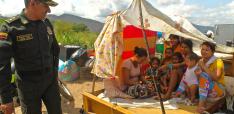Climate Change and Migration: A Call for International Cooperation

Susan S. Ekoh argues that strengthening, rather than diminishing, international cooperation on migration offers important benefits to migrants, sending countries and receiving countries like Germany, particularly in the context of climate change.
The recent elections in the United States and Germany have sparked debates about the future of international cooperation, particularly on polarizing issues such as migration. However, despite its significance, climate change has not received much attention. This is notable because climate change and migration are closely linked, making policy responses essential to addressing this intersection effectively. One major consequence of climate change is the increasing frequency and intensity of extreme weather events, as highlighted by the Intergovernmental Panel on Climate Change (IPCC). These disasters are not confined to a single region but occur worldwide, with some countries more severely affected due to limited resources for preparation and response.
In Europe, countries such as Spain and Germany have experienced extreme flooding in recent years, leading to widespread destruction and disruptions to daily life. Meanwhile, developing countries continue to face devastating climate-related disasters, such as cyclones in Mozambique and rising sea levels in West Africa and the Pacific Islands. The impact of extreme weather events, along with slow-onset changes like drought and desertification, raises a crucial question: Will climate change drive large-scale migration to Germany?
Based on current scientific evidence, the answer is no. While some individuals may cross international borders, most affected people migrate within their own countries or to nearby regions. This does not reduce the need for international cooperation on migration. Instead, it underscores the importance of developed countries working with developing nations to support affected people—whether they choose to migrate or remain in place.
Linking migration as an adaptation strategy with labor mobility
Recognizing migration as an adaptation strategy means supporting the right to move. This perspective is particularly relevant given the recent rise in restrictive migration and refugee policies in the Global North. In the United States, the Trump administration implemented travel bans on certain countries, issued executive orders limiting asylum processing and family reunification, and deportations are currently on the rise. In Germany, recent proposals on migration and refugee management include designating certain countries as "safe third countries," restricting family reunification, and curbing irregular migration. These policies primarily focus on deterrence rather than harnessing the potential benefits of safe, regular, and orderly migration. However, the Social Democratic Party (SPD), a likely coalition partner of the Christian Democratic Union (CDU), continues to advocate for migration policies that attract skilled workers to Germany.
A key strategy for reducing irregular migration is strengthening cooperation with sending countries to facilitate safe, orderly, and regular migration. Some migrants travel through dangerous routes, often driven by climate change alongside other factors. Aligning migration pathways with Germany’s labor needs can address labor shortages while ensuring safer migration routes. Examples of migration as an adaptation strategy already exist, such as New Zealand’s Pacific Access Category Resident Visa, which allows a limited number of people from Kiribati, Tuvalu, Tonga, and Fiji to migrate. Similarly, Australia has an agreement granting permanent residency to people from 10 countries in the Pacific Islands.
Planned relocation strategies can also help vulnerable populations move within their own countries from high-risk areas to safer locations. International cooperation plays a crucial role in these efforts. For example, the German Agency for International Cooperation (GIZ) has supported Fiji in developing planned relocation guidelines through its Human Mobility in the Context of Climate Change (HMCCC) project. There is a significant need and opportunity to expand such cooperation, particularly in regions like West Africa, where coastal populations face rising sea levels and coastal inundation.
Building Resilience In-Place: Supporting the Right to Stay
Cooperation on migration in the context of climate change should also support the right to stay. This means addressing the root causes of migration and displacement, ensuring that affected populations have the option to remain in their communities if they choose. Strategies to achieve this include supporting developing countries and affected communities through adaptation and resilience measures.
Germany’s CDU/CSU and SPD, likely coalition partners in the new government, have expressed commendable commitments to international cooperation on climate change. By assisting vulnerable countries in building adaptation and resilience, risks leading to displacement can be reduced. Effective adaptation strategies may include investments in nature-based solutions, adaptive social protection measures, early warning systems, livelihood diversification, and post-disaster rebuilding and recovery efforts. These initiatives not only mitigate climate risks but also enhance financial security, safety, and livelihood protection.
Development and Climate Finance
Adequate financing for development and climate-related initiatives is essential to effectively address the nexus between climate change and migration. However, recent developments threaten these efforts. The dissolution of the United States Agency for International Development (USAID) and subsequent cuts to development aid could exacerbate migration and refugee challenges. Additionally, the U.S. withdrawal from the Paris Agreement—a global commitment under the UN Framework Convention on Climate Change (UNFCCC) to climate mitigation, adaptation, and finance—puts coordinated global action at risk.
Reducing financial support for migration-related policies and climate adaptation could lead to negative long-term consequences. Strengthening cooperation through increased financial commitments, rather than reducing them, is likely to yield better outcomes for both migration management and climate resilience. While ensuring efficient use of resources is a valid concern, stronger accountability measures should be implemented to guarantee that development and climate finance effectively meet the needs of affected populations.
In conclusion, tackling the intertwined challenges of climate change and migration demands a comprehensive approach. This involves establishing safe and legal migration pathways, bolstering climate adaptation efforts in vulnerable regions, and securing sufficient financial resources for international cooperation. By prioritizing both the right to move and the right to stay—while upholding justice, human rights, and dignity—governments can develop sustainable solutions that benefit both migrants and host communities.
Dr. Susan S. Ekoh is a researcher at the German Institute of Development and Sustainability (IDOS) in Bonn, Germany. She conducts research and provides policy advice to government and non-governmental actors on climate change and human mobility.
Photo by throughmylife_in_ INDIA:


